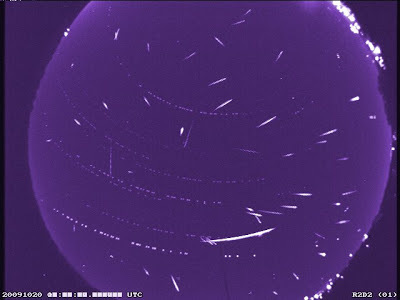Hitting QI in the asteroids
 The 2009 Orionid Meteor Shower (Courtesy of NASA)I dearly love QI, the BBC's quirky factoid quiz show hosted by Stephen Fry. However, as I've pointed out before, the programme's 'aren't you thick, nah nah' attitude makes it fair game when its researchers get it wrong, as they regularly do.
The 2009 Orionid Meteor Shower (Courtesy of NASA)I dearly love QI, the BBC's quirky factoid quiz show hosted by Stephen Fry. However, as I've pointed out before, the programme's 'aren't you thick, nah nah' attitude makes it fair game when its researchers get it wrong, as they regularly do.One of their rather nice revelations on the show was that if you see a meteor crash to earth (a timely subject given the recent Russian meteor strike) and rush to pick up the resultant remains - a meteorite - it won't, as you might expect be incredibly hot, but instead it is likely to be painfully cold. This is because as it comes in through the atmosphere lots of fragments will be ablated from the surface, carrying away the heat, preventing the remnant from heating up.
Unfortunately, according to NASA scientist Donald Yeomans in his book Near-Earth Objects , they haven't got it quite right.
With a rocky object - which is most of them - this ablation will indeed occur, but Yeomans reckons the temperature on impact will be 'little more than ambient temperature' rather than freezing cold. It's worse though. Metallic meteorites are significantly rarer - but they wouldn't ablate in the same way and would retain most of their energy. They would be hot. And here's the clincher. Most meteorites that get found are metallic. Because they stand out. How could you find a few small bits of stone at ambient temperature in a field, say? The majority of meteorites that are ever found are metallic - and chances are these would have been hot on arrival.
Sorry QI - failed again.
Thanks, by the way, for the messages of encouragement to come back to the blog. I had to have a break for medical reasons, which still may cause further interruptions, but at the moment, we're back on track.
Published on February 18, 2013 01:40
No comments have been added yet.



